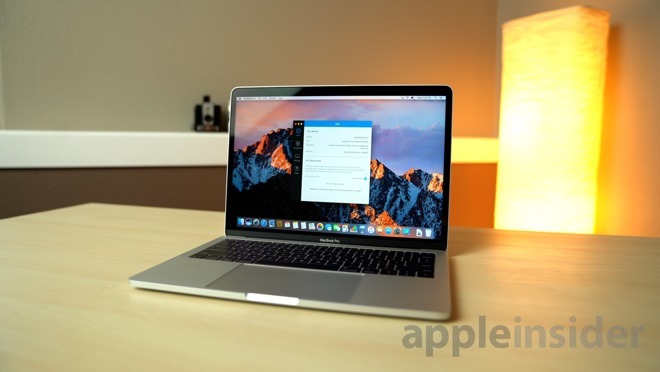Apple on Friday confirmed a "limited number" of solid state drives used in 13-inch MacBook Pro models without Touch Bar are subject to an undisclosed issue that could result in data loss and hardware failure.
Announced in a support document, the problem is limited to 128GB and 256GB SSDs installed in 13-inch "Function Key" MacBook Pro models sold between June 2017 and June 2018. Other drive configurations are unaffected by the issue.
While the exact nature of the complication remains unknown, Apple urges MacBook Pro owners to check repair eligibility and receive drive servicing as soon as possible.
The company provides an online confirmation tool through its website, where owners can quickly enter their device serial number to confirm eligibility. Users can find their computer's serial number by navigating to "About This Mac" in the Apple menu.
Customers who registered their device with Apple, and who have been identified as eligible based on company records, should receive an email about the program.
Eligible MacBook Pro computers can be serviced at an Apple store or an Apple Authorized Service Provider free of charge.
The program covers MacBook Pro models for three years after first retail sale.
Apple launched the 13-inch MacBook Pro without Touch Bar last summer as a more affordable alternative to its Touch Bar-equipped laptops. The company did not update non-Touch Bar models when it rolled out refreshed MacBook Pro hardware in July, though the entry-level laptop remains up for sale.
Today's program arrives less than five months after Apple launched a separate repair initiative to deal with customer complaints questioning the reliability of the butterfly keyboard mechanism used in modern MacBook Pro models. Last year, customers began to report issues with the switch architecture, saying small amounts of dust and debris would render keys inoperable. Apple indirectly acknowledged the issue in a support document outlining a method of cleaning affected keyboards with a can of compressed air before initiating a service program to address the issue.
 Mikey Campbell
Mikey Campbell








 Charles Martin
Charles Martin
 Malcolm Owen
Malcolm Owen
 William Gallagher
William Gallagher

 Christine McKee
Christine McKee
 Wesley Hilliard
Wesley Hilliard

 Andrew Orr
Andrew Orr







35 Comments
So much for SSDs being reliable enough to be soldered on. Apple's now going to have to replace $600 logic boards rather than $100 SSDs. Perhaps this is why the Mini is not quite as monolithic as it could have been...
Guys, the SSD is soldered on. Apple claims this is for performance reasons, which might even be true. It would seem based on benchmark comparisons with the XPS there might be at least a bit of a speed benefit, although that might be because of the T2.
However, while it all so very conveniently for Apple substantially raises the cost at initial purchase for anything above base configuration, but it also means the user can’t service their own machine, and as this example demonstrates, raises the cost of repair if anything goes wrong. Not only cost of repair, but look at this example: a person could just replace the SSD themselves, or a thirty second job at an Apple store, but no, this requires a job where the whole logic board has to be replaced. How inconvenient.
Apple really needs to rethink this soldered SSD strategy, if nothing else because it is costing a hell of a lot in good will.